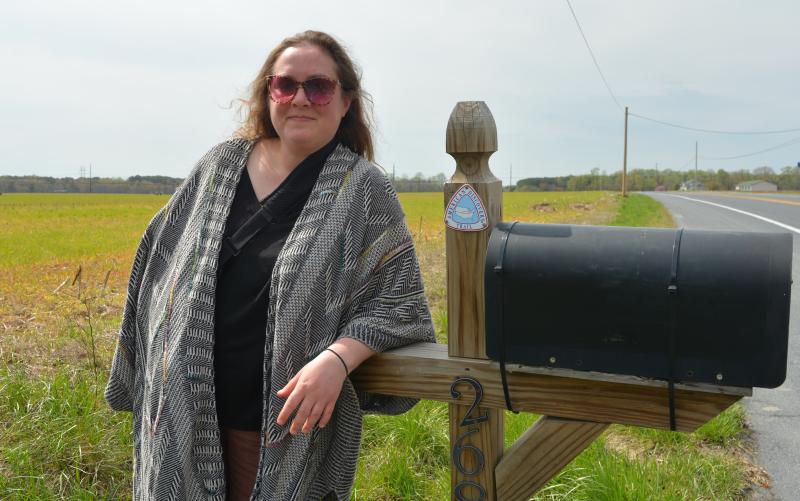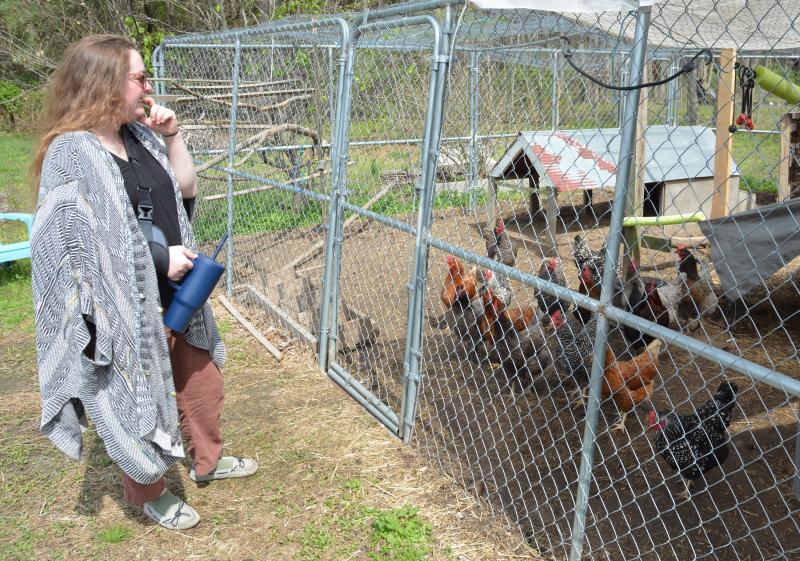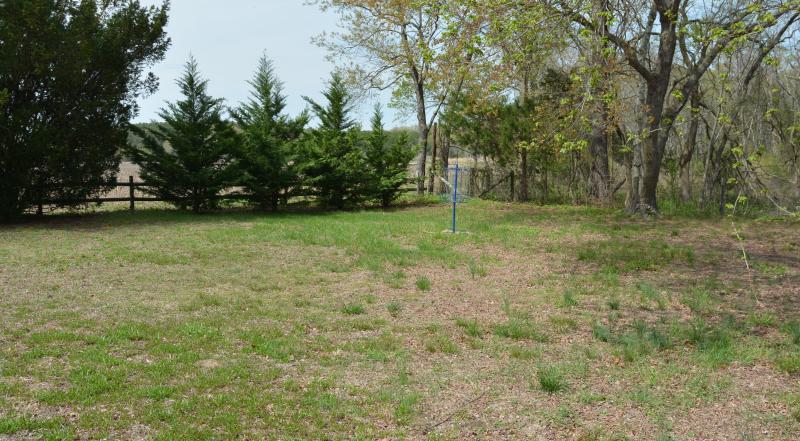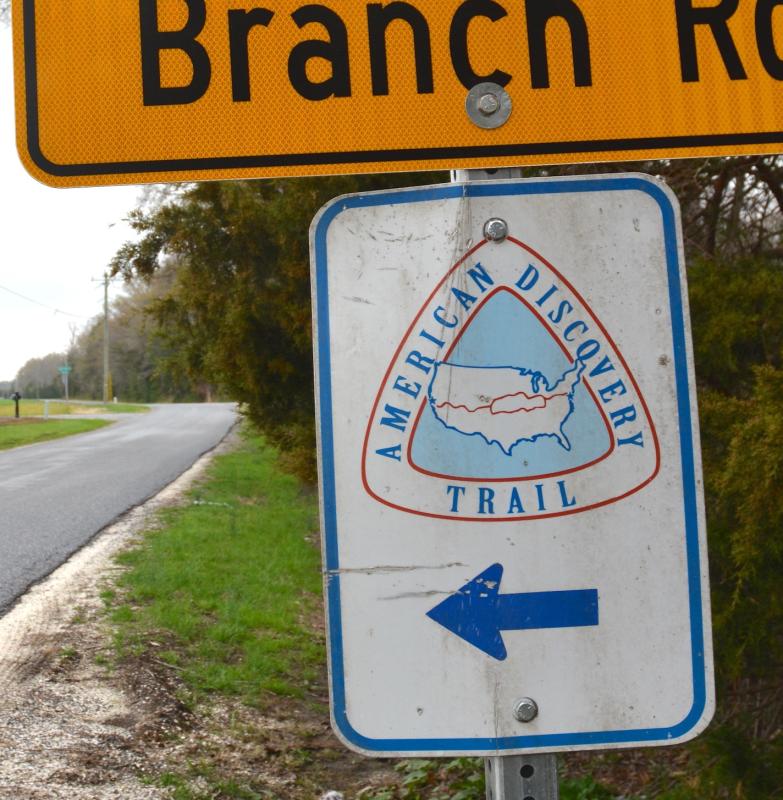Cait Pinkleton is an American Discovery Trail angel
Depending on the route taken, an American Discovery Trail hiker will walk between 4,800 and 5,000 miles. Along the way, weary hikers will encounter trail angels who live on or near the path and are happy to provide food, shelter and guidance.
One of those trail angels is Cait Pinkleton. She lives off Cave Neck Road, outside Milton. Her property, which is right along the trail, is known as ADT Pink Camp. She said it’s about giving hikers a safe place to stay for a night or two.
“People will show up unannounced. We’ll see them on the road and ask if they need help,” said Pinkleton. “The goal is to give them a place that’s inviting.”
According to the website maintained by the American Discovery Trail Society, in 1989, the American Hiking Society and Backpacker magazine proposed the idea of a coast-to-coast trail that would be the backbone of the National Trails System. The AHS hired a national coordinator in 1991 to work with volunteer state coordinators to develop and refine the route. The cross-country trail now runs from Cape Henlopen State Park in Lewes to Limantour Beach, Calif.
The ADT Pink Camp is just up the road from the bridge crossing Beaverdam Creek, between Hudson and Diamond Farm roads. It’s on the right side of the road, heading toward Milton. Pinkleton said she’s lived in the house off and on for 20 years. She and her mom started noticing hikers 10 to 15 years ago.
The mailbox for the property, which is on the left side of the road, has a small ADT symbol attached to the post on the bridge side.
A lot of the hikers are from the West Coast, so they’re starting here in Delaware and working their way back home, said Pinkleton. This is the side of the mailbox that most of them are going to see, she said.
Pinkleton hasn’t hiked the American Discovery Trail herself, but she said has done solo hiking in Central America – Costa Rica, Guatemala, Panama.
“I’ve been down and out in another country, all sweaty, with gross, wet feet. People were nice enough to let me stay,” said Pinkleton. “Once you’ve been helped on a trail before, you want to help other hikers, no matter where you are.”
Pinkleton said the trail angels form an underground network of people all over the country. For example, she said, there’s an angel out west who leaves water supplies along the trail near their home in the desert because there’s not another water station for 30 miles.
Pinkleton said not all hikers stop at their camp; she’s seen hikers set up camp on the forest side of the guardrails, near the bridge. Some of the hikers are doing it anonymously and don’t make a big deal about their pending adventure, she said.
“They just set out on their way,” said Pinkleton.
Late February and early March is when most hikers begin their trek from Cape Henlopen State Park. Even starting now would be late, said Pinkleton, on an unseasonably warm early-April afternoon.
“If they start in the fall, they’d hit the central part of the trail in the middle of winter, and it’s too hot around here to start in the summer,” she said.
As far as Pinkleton is aware, she’s the only trail angel stop along the Delaware section of the ADT, which is about 45 miles long. There’s an ADT lean-to at Tuckahoe State Park in Maryland, but other than that, there’s not much, and oftentimes hikers are stealth camping in areas where they might not be allowed.
“Stealth camping is questionable, and it means hikers need to be ready to leave at a moment's notice,” she said. “Word gets around about the availability of the camp.”
Pinkleton said a lot of the property owners who live along the ADT are aware of the hikers and generally what they look like – young men, but sometimes women, with large backpacks. Sometimes they’re pulling or pushing trailers, she said.
Pinkleton said compared to the older and more established Appalachian or Pacific Crest trails, there aren’t nearly as many hikers on the ADT. She’s never had more than 15 hikers in one year, she said.
For the most part, Pinkleton said, the individuals are serious hikers who want the experience. Sometimes, she said, it’s people who are just looking for something to do.
“There are not a lot of sightseers, but there have been some,” she said.
Pinkleton will help hikers do slack packing, which is letting hikers keep all their belongings at the camp for the day while they’re hiking. They’ll let Pinkleton know their destination goal and she’ll meet them at that location later in the day, bring them back to her camp for the night and then drop them back off at that location the following day with all their equipment.
Sometimes hikers realize pretty quickly they’ve packed too much stuff in preparation for the trip. Pinkleton has shipped excess materials ahead for hikers.
The accommodations at the camp are pretty simple. They can stay in the front yard, the backyard or in the barn, if they need to be covered.
“The backyard isn’t much, but at least it’s fenced in and the hikers aren’t woken up by the chickens in the morning,” said Pinkleton.
The chickens may wake early, but Pinkleton said she likes to give hikers hard-boiled eggs as a going-away treat.
“They’re little nuggets of energy,” she said.
Once a year, around early spring, Pinkleton said she’ll leave messages on some of the community Facebook pages reminding people that hikers are coming through.
“Please don’t call the cops. Instead, offer them food or water,” she said.
Chris Flood has been working for the Cape Gazette since early 2014. He currently covers Rehoboth Beach and Henlopen Acres, but has also covered Dewey Beach and the state government. He covers environmental stories, business stories and random stories on subjects he finds interesting, and he also writes a column called Choppin’ Wood that runs every other week. Additionally, Flood moonlights as the company’s circulation manager, which primarily means fixing boxes that are jammed with coins during daylight hours, but sometimes means delivering papers in the middle of the night. He’s a graduate of the University of Maine and the Landing School of Boat Building & Design.






















































